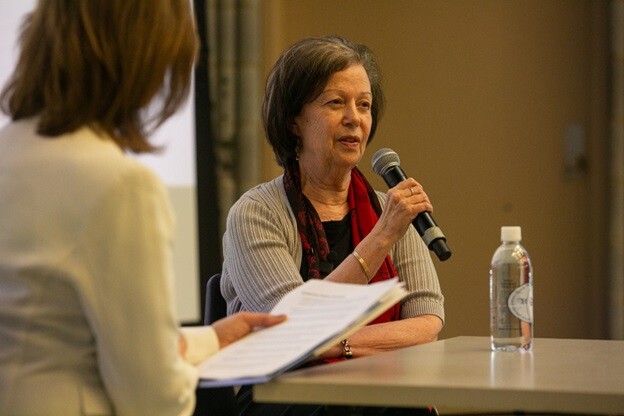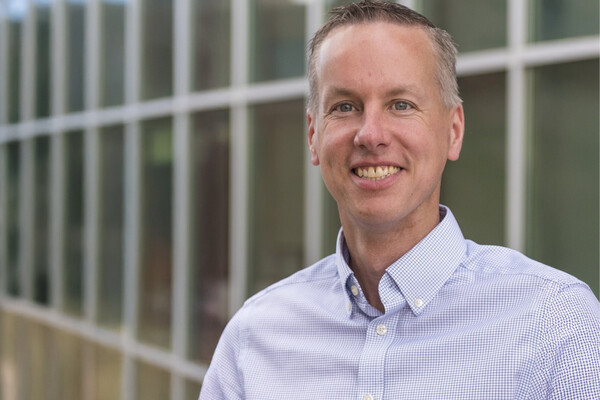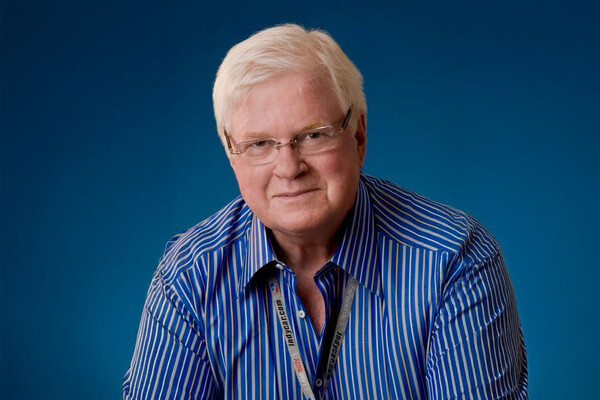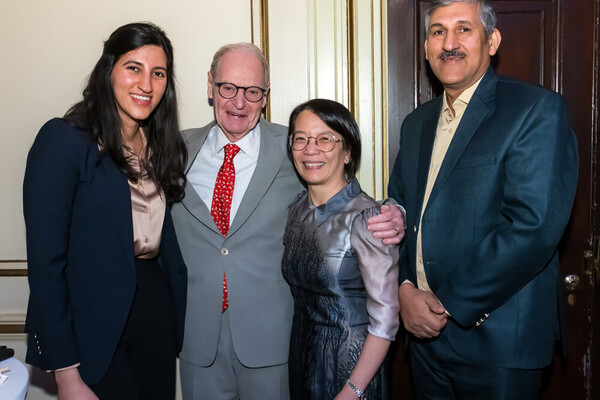Main Second Level Navigation
Breadcrumbs
- Home
- News & Events
- Recent News
- Alumni Profile: Aura Kagan on a lifetime of advocacy and care for people living with aphasia
Alumni Profile: Aura Kagan on a lifetime of advocacy and care for people living with aphasia

Aura Kagan (PhD ‘99, Institute of Medical Science) is the former executive director of the Aphasia Institute in Toronto and a long-time advocate for people living with aphasia. Kagan recently made history as the first-ever speech-language pathologist to be appointed a member of the Order of Canada.
Aphasia is a communication problem that masks a person’s inherent competence. It is usually the lasting result of a stroke or brain injury, but may also be caused by other neurological conditions such as dementia or brain tumours. Aphasia is not well known or understood and may be classified as an ‘invisible’ disability.
Having dedicated her career to addressing the real-world challenges faced by individuals with aphasia and their families, Kagan’s advocacy and commitment to communication sciences have led to groundbreaking advances, including most notably, the development of Supported Conversation for Adults with Aphasia (SCA™). This evidence-based approach reduces language barriers, empowers individuals with aphasia and is recognized in the Canadian Stroke Best Practice Guidelines.
As part of Speech & Hearing Month celebrations in May, the Department of Speech-Language Pathology (SLP) at the Temerty Faculty of Medicine was honoured to host Kagan as a keynote speaker at its annual SLP Clinical Research Day. During the event, SLP Chair Rosemary Martino, engaged in a live one-on-one conversation with Kagan, in which they discussed her distinguished career, the future of speech-language pathology and clinical practice, her trailblazing contributions to the field of aphasia and more.
Martino: Dr. Kagan, congratulations on being appointed a member of the Order of Canada! This is such a well-deserved honour. What does this recognition mean to you, and how does it reflect your lifelong dedication to the field of aphasia?
Kagan: Thank you. This recognition means a great deal, particularly for the field of speech-language pathology. Aphasia is often considered an "orphan disability" due to its lack of public awareness, so this appointment helps bring attention to the condition. It also highlights the importance of real-life impact and participation-focused approaches. It's not only a personal honour, but a validation of the meaningful work happening in Canada.
Martino: You’ve been a driving force behind the Aphasia Institute since you joined in 1986, initially as its first full-time speech-language pathologist. Can you share what drew you to the Aphasia Institute and what the early days were like for you in this role?
Kagan: I first encountered aphasia while working in home care. I saw firsthand how services abruptly ended when treatment stopped, leaving people with aphasia isolated. When I joined the Aphasia Institute, it was a small community centre with just two groups. I was struck by seeing people with aphasia engaging in conversations. It was a powerful realization, and I spent years trying to unpack what made those interactions work. That insight became foundational to my research, with the goal of capturing and sharing that approach more broadly.
Martino: Your work in aphasia has not only influenced clinical practice but has also sparked major advancements in how we approach communication barriers. How have you seen the field of aphasia care evolve over the years, and where do you see it going in the future?
Kagan: The field has evolved significantly. After World War II, the approach became highly medicalized, focusing mostly on impairment. Over time, we shifted to broader frameworks like the Life Participation Approach to Aphasia, which emphasizes participation and the role of the environment. This reframing has helped us understand that improving language skills is only part of the picture. We must also look at social and systemic barriers.
Martino: Your work has had a profound impact not just in Canada but globally. What has been the most rewarding part of seeing clinicians and volunteers around the world implement SCA™ and transform the lives of those with aphasia? How has your work impacted the global understanding of aphasia?
Kagan: It began with a project to create videos showing how communication skills influence interactions with people with aphasia. I made what are now known as the "Gerry videos" to show how conversation changes depending on the communication skills of the conversation partner. I presented it at a neurology conference where one participant reacted strongly, assuming that the interviewer in the video was incompetent. This experience indicated the need for evidence that would speak to medical professionals and prompted me to embark on a randomized controlled trial. Results of the study helped validate Supported Conversation for Adults with Aphasia (SCA™), which is now used internationally.
Martino: Having dedicated so much of your career to improving the lives of individuals with aphasia, what would you say has been the most significant change in how society views and supports those with communication challenges?
Kagan: Unfortunately, societal understanding and support for communication disabilities have not advanced as much as for physical disabilities. We've made some progress related to the need for increased communicative access and support for conversation, including in the healthcare context. But there is still a long way to go. It requires a collective effort, and we need more advocacy to push for accessible communication environments.
Martino: For those who are new to the field of speech-language pathology or are interested in aphasia care, what advice would you offer to help them make a meaningful impact, just as you have?
Kagan: Get involved with community organizations and try to understand the full context of living with aphasia. Always remember the end goal: helping people live fuller, more meaningful lives. Ground your practice in that purpose, and let it guide your decisions.
Martino: As someone who’s seen the field grow and evolve, what do you think are the biggest challenges or gaps in aphasia care today, and what steps should we take to address them moving forward?
Kagan: One major challenge is education and curriculum development. We need better resources for community support and should prioritize teaching communication skills to all health professionals. There's also a need for more consistency in treatment approaches. We must critically examine what we mean by "evidence-based practice." That term was originally developed in Canada to standardize medical approaches, but it doesn't always fit the realities of aphasia care. I prefer the term "better practice" and believe we need a unified foundational framework that reflects and includes the complexities of real-world clinical settings.
Matino: What inspired you to return to the University of Toronto for your PhD in the Institute of Medical Science with a Speech-Language Pathology lens, and how did that experience shape your research and future contributions to aphasia care?
Kagan: The tough experience presenting at a conference of neurologists made me realize the need for convincing evidence-based research. Dr. Sandra Black encouraged me to pursue a PhD and even offered to supervise me. My committee was fascinating. It included SLPs, a social worker and a theoretical physicist interested in conversation. That broad input helped me think outside of traditional frameworks, and ultimately shaped my contributions to the field.
Martino: Finally, as someone who has mentored and inspired countless individuals in the field, what is the one piece of advice you would give to young clinicians, researchers, or anyone entering the world of aphasia care?
Kagan: Ethics and codes of conduct are easy to find, but one of the most meaningful principles I've encountered comes from Judy Duchan, professor emeritus at the University of Buffalo: "Do as you would be done by." Treat people the way you would want to be treated. That mindset should guide your practice, whether it's implementing research into clinical settings or advocating for inclusive stroke funding that includes aphasia support.
News


